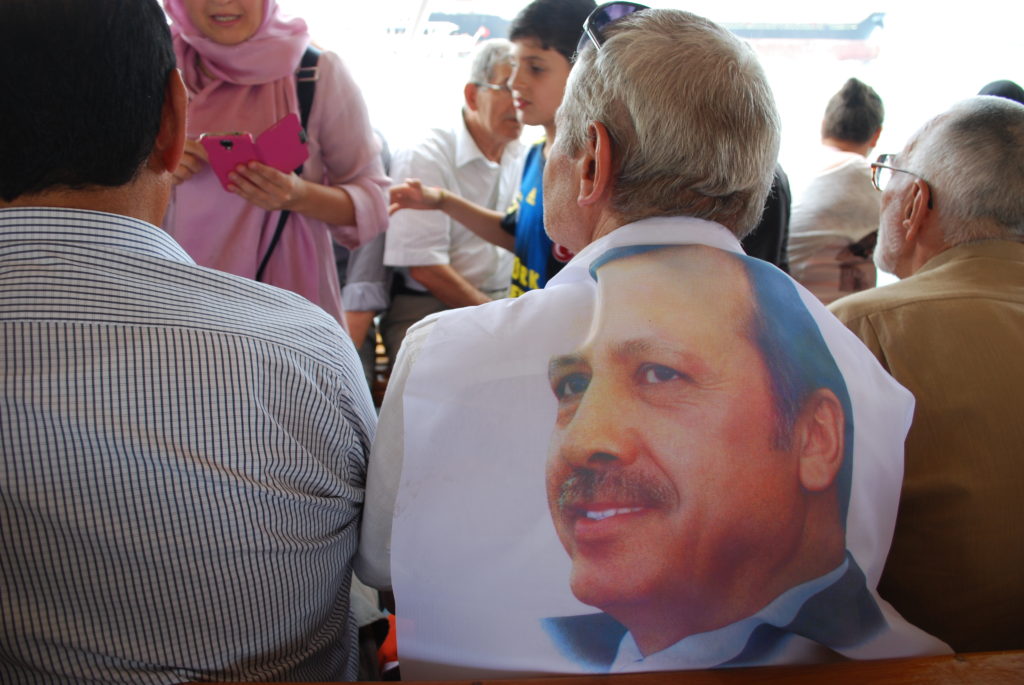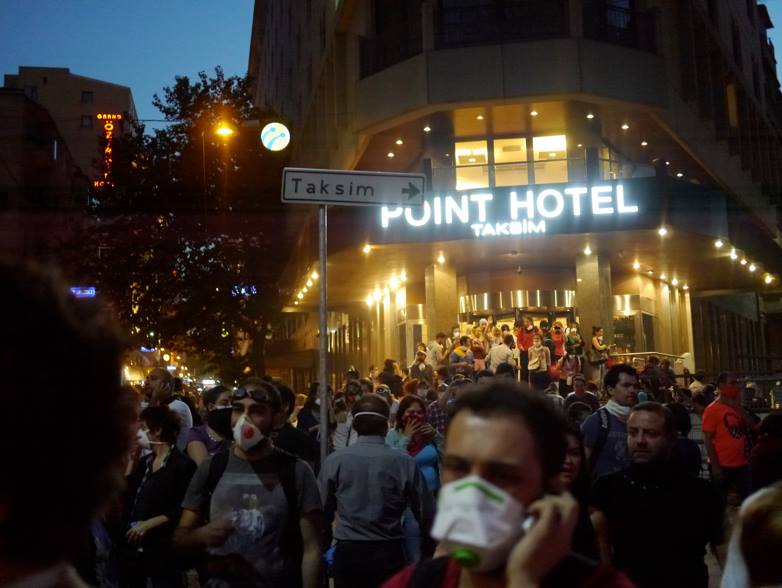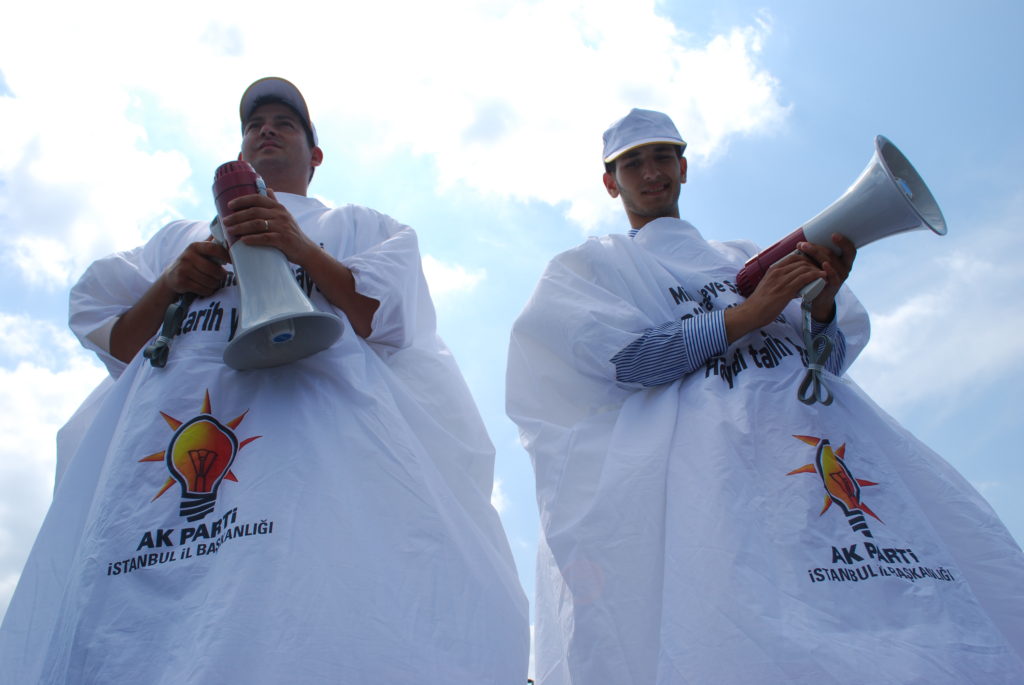
AKP supporters encourage people to board ferries bound for the pro-government rally in Kazlıçeşme. Photo: Jenna Krajeski.
By Jenna Krajeski
On June 17th, after nearly two months of anti-government protests, Turkish Prime Minister Recep Tayyip Erdoğan rallied his supporters in Kazlıçeşme, on a large fair ground about six miles from Gezi Park, where the protests had originated. Since May, the prime minister had vacillated between condemning the protesters, calling them drunks and looters, and ignoring them. His harsh response, manifested on the streets at the hands of his riot police, captured the world’s attention. Photos had already proliferated in local and foreign media of protesters hit at point blank range with pepper spray, cornered by riot police or pushed down city streets by water cannons. Some protesters had crowd-sourced funding for a full-page ad in the New York Times. Block letters asked “What’s Happening in Turkey?” behind a photo of a soaring tear gas canister. At the bottom of the ad, protesters had listed a few of their demands: a free media, an end to police brutality, and government accountability.
For weeks, I had been covering the protests and Erdoğan’s response, which was alternately described as foolish and arrogant. I had seen water cannons shot into hospital courtyards, families racing through clouds of tear gas, and police pacing through the streets in the early morning, tear gas launchers at the ready. There was much more that I did not see, like the lobby of the Divan Hotel becoming a trap full of tear gas, Erdoğan waving to his supporters in Ankara, a protester killed in Antakya, Erdoğan on TV refusing to compromise on his plans to develop Taksim Square, Erdoğan lauding the behavior of the riot police, those riot police slouched on traffic medians, napping. On June 17, as I walked from the ferry terminal to the fair ground, a friend emailed me a photo of a clash between riot police and protesters on a narrow, residential street. Her message was short: “And, meanwhile in Taksim…”
I worried that it would be difficult to empathize with the thousands who showed up that day in Kazlıçeşme. From the perspective of the protesters—and increasingly the world—it seemed the prime minister was, at best, out of touch and at worst brutally authoritarian; therefore his supporters must be of similar character. Outsiders usually rationalized their loyalty to Erdoğan and his Justice and Development Party (AKP) by their religious connection to the prime minister, a connection which Erdoğan is generally believed to exploit for political gain. But just like in Gezi, the scene in Kazlıçeşme was not that simple.
Government chartered ferries dispatched cheerful AKP supporters onto the concrete dock. Couples strolled arm in arm; fathers carried children on their shoulders; a man blew a vuvuzela. They walked in the hot sun from the dock to the fairground, waving Turkish flags and photos of Erdoğan. Vendors waited with ice buckets full of sodas and carts of pastries. Beyond a green lawn full of picnickers, the Marmara glistened.
Three women in black hijab carried orange flags adorned with a light bulb, the symbol of the AKP. They were adamant in their support of Erdoğan, both his economic policies and his character, which they described as “strong.” They were furious that the international media portrayed them as uncaring when it came to the protesters and almost apolitical in their following of the AKP, driven only by a common religious identity. In fact, they noted, there had been plenty of observant Turks at the protests, Turks who were more alienated by Erdoğan’s neoliberal economic values than drawn in by his piousness. But this, they thought, had not been accurately conveyed in the media coverage. No one had asked them why they support Erdoğan and reject the protests. “Write what you see,” one of them told me. Her command carried a sharp edge.
At the fairground, revelers hoisted an oversized translucent portrait of Erdoğan above their heads and circled the grassy areas, a one-float parade. Others wore a photo of Erdoğan over their own faces, masks with mouth and eyes poked out, and waited impatiently along the road for the prime minister to arrive; Erdoğan often waves to fans from the front of his bus as it pulls into events. Teenage boys tore down hanging flags to keep as souvenirs. Decorated city buses honked as they slowed down to let off passengers. “Erdoğan has made Turkey important,” a woman told me, her eyes obscured by the wide dark lenses of designer sunglasses. “It’s because of him that people all around the world respect us.”
A cluster of men in their thirties sat in the shade of a narrow tree. They echoed the young woman’s views. In the decade since the AKP took power, Turkey’s economy has increased steadily and so has its standing as a regional power (although that standing has taken some blows lately). The men were middle class and college-educated, achievements they attributed to Erdoğan. For the women in attendance, the effect was often more poignant; before the AKP took power they were unable to attend university in a headscarf. When he finally made it to the podium hours later, Erdoğan would loudly remind them of this fact.
I showed the men my friend’s photo from the protest—in which a small crowd was engulfed by tear gas. “This is happening now,” I said and pointed in the direction of Taksim. One of the men shook his head. He made a gesture like he was chugging a bottle of beer and said, “They are drunk. They don’t know what they’re doing.” Another chimed in, this time employing a favorite defense of the AKP since the protests began. “They are only marginal groups,” he told me.
In his speech, Erdoğan worked hard to define what he considered to be the “real,” non-marginal Turkey, naming the media organizations—the BBC, CNN, Reuters—he felt had most mislead the public. “Days on end, you have produced false news,” he said. “You portrayed a different Turkey to the world. You were alone with your lies. This nation is not the one you promote to the world.”
At the opposite end of the fairground was a small mosque. Sandals and dress shoes sat atop a short wall, and the observant Muslims who could not fit inside of the mosque lay down cardboard and prayed in the middle of the crowd. Earlier in the speech, Erdoğan had referred to the heathenism of the Gezi Park protesters, accusing them of attacking women in headscarves and drinking alcohol in mosques, shoeless. He reminded the crowd of his role as protector of Turkey’s devout. The point he made with such vitriol was being made quietly by the praying men. The vast majority of Turkey is Muslim, and for the observant among them, the Turkish revolution wasn’t happening in Gezi Park. It had already happened, over a decade ago, with the election of Erdoğan.
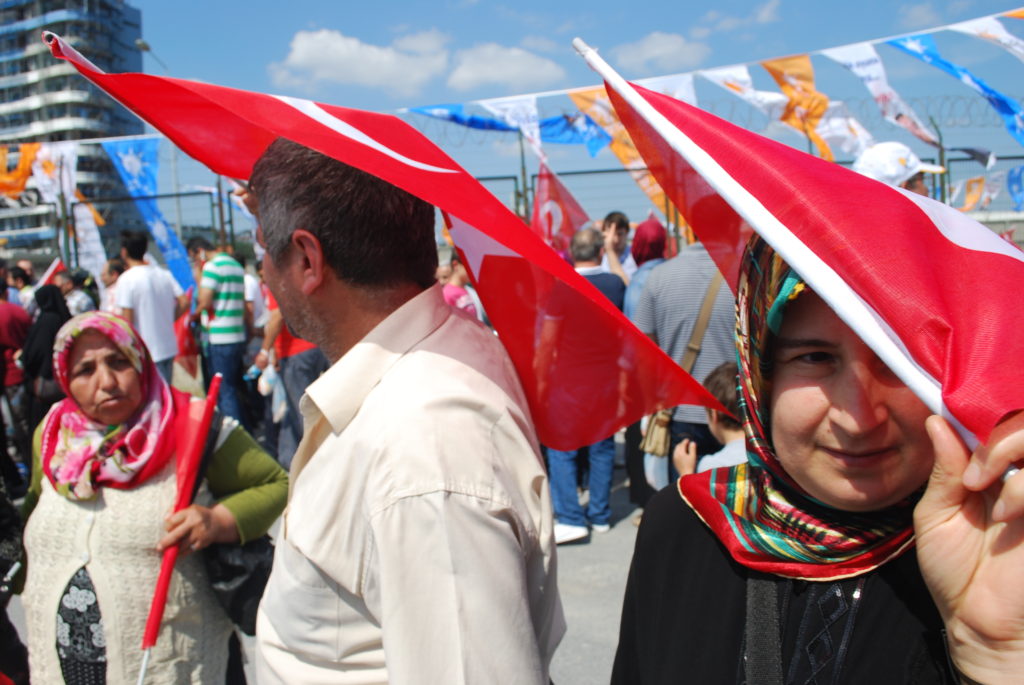
Supporters of Prime Minister Recep Tayyip Erdogan shield themselves from the midday sun with Turkish flags on their way to a rally in support of Erdoğan and the AKP. Photo: Jenna Krajeski.
The AKP was founded in 2001 and won its first election, by a large percentage, in 2002. Although the parties that served as its prologue were Islamist, the AKP has functioned more as a center-right party with a religious identity. It made economic growth and development top priorities. Along with economic growth came political stability. A (now distant) foreign policy dubbed “zero problems with neighbors” made Turkey a regional leader—many referred to it as a “model” for the evolving governments of the Middle East—a feat for which the AKP, and Erdoğan, happily took credit.
Not all AKP supporters are observant Muslims but, for those who are, the party’s religious identity is also a selling point. Before the AKP took power many of them struggled to reconcile their religious beliefs with their patriotism. In 1923, when Mustafa Kemal Atatürk founded the Turkish Republic, he imposed a shared identity as a way of uniting a diverse population under one flag. Islam was a key feature of “Turkishness”—Christians and Jews faced systematic discrimination—but in the early decades of the republic it was more of a cultural roadmap than strict faith. Turks would have Islam in common as a tradition, but religious expression was controlled and religion was kept out of the government.
For a new nation, these strict qualifications seemed existential, and throughout Turkish history—rife with conflict and numerous military coups—also seen as key to stability. But with religion kept out of arenas of power it soon became equated with the less influential portion of the Turkish public. To some, religion signified a lack of education, and state secularism reinforced stereotypes of rural and unsophisticated religious Turks. Turks who succeeded in business tended to be secular. Religion became the driving characteristic of a class divide.
Under secular governments, practicing Muslims faced discrimination. Women were banned from wearing a headscarf in government buildings like schools, and covering at all could attract negative attention. Religious Turks felt they were on the losing end of a culture war which in the 1990s would come to be defined by the terms “white Turks,” referring to the Republican elite, and “black Turks,” referring to working-class, devout Muslims. But most Turks, polls have shown, remained devout under secularism. They were not, however, represented in the government.
In 1980, a military coup shattered the country and when the military left power in 1983 then-president Turgut Ozal was tasked with rebuilding. In an effort to bond the country, Ozal made substantial overtures to religious Turks. Turkey scholar Jenny White describes these years in her book “Muslim Nationalism and the New Turks” as an “extraordinary explosion of self-consciously Islamic politics and public discourse.” White later cites a 1999 poll that puts the number of highly religious Turks, those who put religion over nationality, at 40 percent. The AKP took power with this wind at its back.
During his campaign, Erdoğan, who has a working-class background, referred to himself proudly as a “black Turk.” It was the kind of savvy declaration that immediately implanted him in the hearts of those like him.
In early October—a few months after the rally in Kazlıçeşme—I went to the AKP’s Istanbul headquarters to meet with Abdulkadir Karagöz, the head of the AKP youth, and two of his colleagues,Recai Ögcem and Erdem Dereli. The headquarters are in Eyüp, a working class neighborhood, and across the street from Miniaturk, where tourists can opt to see smaller versions of Turkey’s attractions. Karagöz is a graduate of the prestigious Boğaziçi University and an entrepreneur, selling chocolate fountains to shopping centers. He proudly led me around the youth branch offices. They have a whole floor. “Have you ever been to the CHP office?” Karagöz asked me, referring to the Republican People’s Party, the main opposition. “I’d be surprised if they even have one room for youth.”
Karagöz is in his twenties and has probably never suffered directly from the kind of oppression his parent’s generation felt as observant Muslims. Nevertheless, he attributes much of his loyalty to Erdoğan and the AKP to their attention to underdogs. “We need to understand everyone,” he told me. “Kurdish, Armenians, conservatives, liberals… We find a way to understand them and help solve their problems.”
He was eager to explain that, although he supports Erdoğan, he does not hate Atatürk. He pointed to a framed portrait hanging on the office wall. “You know him? He founded the Turkish Republic. We respect him… but there are some people, radical Kemalists, who think the AK party is trying to erase Atatürk’s actions, or his thoughts. This is wrong. Atatürk is the founder of the Turkish Republic and he’s a hero, but they have to understand that he lived a hundred years ago and the world today is different.”
Karagöz is young and educated and upwardly mobile, and he has internalized the threat of secularism. He is loyal to the AKP, partly because even on the brink of his own bright future he fears a secular government. “[Secularists] were Big Brothers,” he said. “They pushed the public, they said you should live like this. You cannot go to university in a headscarf. You cannot be a teacher in a headscarf. You cannot be in the army if you are Islamic… If you are a Kurd you are a third class citizen.”
Over the past ten years, the AKP has significantly lifted the ban on headscarves (they are now legal everywhere but in the military, the police, and in court), prosecuted military officials for links to the coup (critics say in order to weed out opposition), and developed Turkey’s economy. They have made more significant progress on issues of religious and ethnic minorities, like the Kurds, than any previous administration. “Our name is conservative,” Karagöz said, “but we are the most reformist party in Turkey… the AK party offers hope for youth.”
During his campaign, Erdoğan, who has a working-class background, referred to himself proudly as a “black Turk.” It was the kind of savvy declaration that immediately implanted him in the hearts of those like him. “Ten years ago, black Turks were second class citizens,” Karagöz said. “Now black Turks run the country.”
In this triumphant environment, the Gezi protests seemed to come as a shock. Without understanding where the urge to protest came from, many AKP supporters worried that the protests were based on a secular agenda, and were designed to turn back the progress Erdoğan and the AKP have made for observant Turks. But Gezi Park attracted a range of opposition and activist groups, from LGBT rights groups to the Anti-Capitalist Muslims, united because of a shared dissatisfaction with the AKP. “After 2010… [the AKP] were able to appoint Supreme Court judges,” Mehmet Ali Tuğtan, a professor of International Relations at Istanbul’s Bilgi University, told me. “They felt much less restrained.” For those in Gezi Park, discontent had been building for those three years.
They complained of Erdoğan’s vision of a developed Istanbul with a lot of “record-breaking” development projects, like Europe’s largest airport or a canal that would make part of Istanbul an island. These projects have drastic environmental and social consequences, but experts in the relevant fields say the government has ignored them.
Gezi protesters pointed out that Turkey imprisons journalists at a higher rate than any other country. Two umbrella court cases—one meant to prosecute military for their role in the 1980 military coup and the other to combat terrorism –have swept dissenters into jail. Freedom of expression is treated by Erdoğan as a weapon, not a right.
When Erdoğan began to bring religious moralizing into his politics—banning the sale of alcohol after 10 p.m., suggesting that women have “at least three children” –the alarms rang louder. The speed and single-mindedness with which these opinions were voiced and then transformed into regulations, or at least into accepted rhetoric, smacked of authoritarianism. On all these issues, the brutality of the police force during the Gezi protests was an exclamation point.
On a sunny Saturday afternoon in mid-October I met Merve Kavakçı, a Turkish politician turned university professor. In 1999, Kavakçı was elected to parliament but denied her seat after she tried to take the oath of office wearing a headscarf. Her appearance in a headscarf was a protest against the ban on head coverings in parliament, and her expulsion made her famous. It led to the dissolution of the Virtue Party—a forebear to the AKP, of which Kavakçı was a member—and it pushed the so-called “headscarf issue” to the fore. One of the AKP’s key campaign promises was that they would abolish the ban, and they have, mostly. A couple of weeks before I met Kavakçı , Erdoğan had announced a new “democracy package” with a provision that allowed most public employees to wear headscarves. “Very interestingly, a government that people inside and outside thought would take Turkey backwards because of its Islamic roots is [the party] in Turkey that has made more strides than any other so-called secular government,” Kavakçı said.
“It’s not very often you see a man like Erdoğan,” Kavakçı told me, “who is a people’s man, who speaks the language of the people.” She had flown to Turkey from Washington DC, where she lives, for the kurban bayrami, the Islamic Feast of the Sacrifice known in Arabic as eid al-adha in which, typically, a lamb is slaughtered to honor Abraham’s sacrifice of Ishmael. Certain parts of Istanbul (such as Eyüp, where the AKP headquarters are) can reek of livestock in the days before the bayram, but Kadikoy—an upscale neighborhood on the Asian side that is also a CHP stronghold—smelled mostly of car exhaust and bakeries.
Kavakçı supports the AKP and Erdoğan, although not on all points. She complains about the time it’s taken to repeal the ban on headscarves, and that the repeal remains partial. They are “assuming that the uncovered woman with an uncovered head is the optimal owner of objectivity,” Kavakçı said. “That, I reject. In this country, if somebody oppressed somebody else, it was the women without headscarves oppressing the women with headscarves with no objectivity. Not the other way around.”
But Kavakçı sees the AKP as a vast improvement over previous governments, and she’s coined a useful term. “Secular fundamentalism,” she says, arose as the founding ideology of the Turkish state when it compounded its ambition to be a modern democracy with a fear that religion would impede that democracy. “We took this French model and turned it up a notch or two,” she told me. But “Turkish secularism is a state religion.”
The AKP is lucky to have ambassadors like Kavakçı, who challenges the assumption that her religion draws a binding contract between her and the AKP, and instead defines Islam as a counterweight to a secularism, which she considers more oppressive. She is also familiar with some western perspectives on Muslims, and can eloquently defend Erdoğan in that context. “I live in Washington DC where many neocons also live,” she said, “and no matter what Erdoğan does he’s just an Islamist in their minds and Islam… is just the enemy.”
But her most valuable role these days is her defense of Erdoğan not for American neocons post-War on Terror, but for Turks post-Gezi. “I find the Turkish Kemalists much more difficult to deal with than a Western person who has a distance to the Islamic tradition. Westerners are at least a little bit more open-minded.”
At the beginning, Gezi Park was a protest against urban development, but as it grew it took on the tones and colors of the political opposition to the AKP. Atatürk flags proliferated at the protests, as did chants like “We are the soldiers of Mustafa Kemal.” Erdoğan had threatened to demolish Taksim Square’s Atatürk Cultural Center and replace it with a mosque; in response, protesters blanketed the building with opposition banners and one enormous portrait of Atatürk. When the “standing man” began his protest in the middle of Taksim Square, he stood facing the portrait.
Kavakçı says environmentalism is ingrained in Islam, and she supported the early phase of the protests. But she was alienated by the Kemalist rhetoric. “Two things made me decide that I do not belong to Gezi,” Kavakçı said. “One is this is mere opposition to the AKP, which stands in many people’s minds, from the perspective of the opposition, as Islam… Secondly, these people come across as anti-headscarf, anti-religious. Everything boils down to Islam versus.”
“The problem is Islamophobia worldwide,” Karagöz told me. He doesn’t understand why the Gezi protests were compared to the Arab Spring and not to Occupy Wall Street, which he felt they more closely resembled, at least at first. “I was at Occupy Wall Street, I observed it. The police destroyed the tents. It was in a park,” he said. He blamed the comparison to the Arab spring on a “Western perspective” which rushed to classify Erdoğan as a Middle Eastern dictator because, like other Middle Eastern leaders, he is a Muslim. “You know, there were protests in London and many people were hurt,” he said. “But no one called Cameron a dictator.”
Had either Kavakçı or Karagöz visited Gezi during the later phases of the protests they would have noticed that both their grievances—that Kemalist rhetoric had taken over and that the protest should be compared to OWS and not the Arab Spring—were shared by Gezi protesters. The chant “We are the soldiers of Mustafa Kemal,” was even satirized, Atatürk’s name replaced by a comedian’s—at least until the protests became focused on countering police violence. But they stayed away. A dangerous polarization had taken deeper root in Turkey, thanks in no small part to Erdoğan.
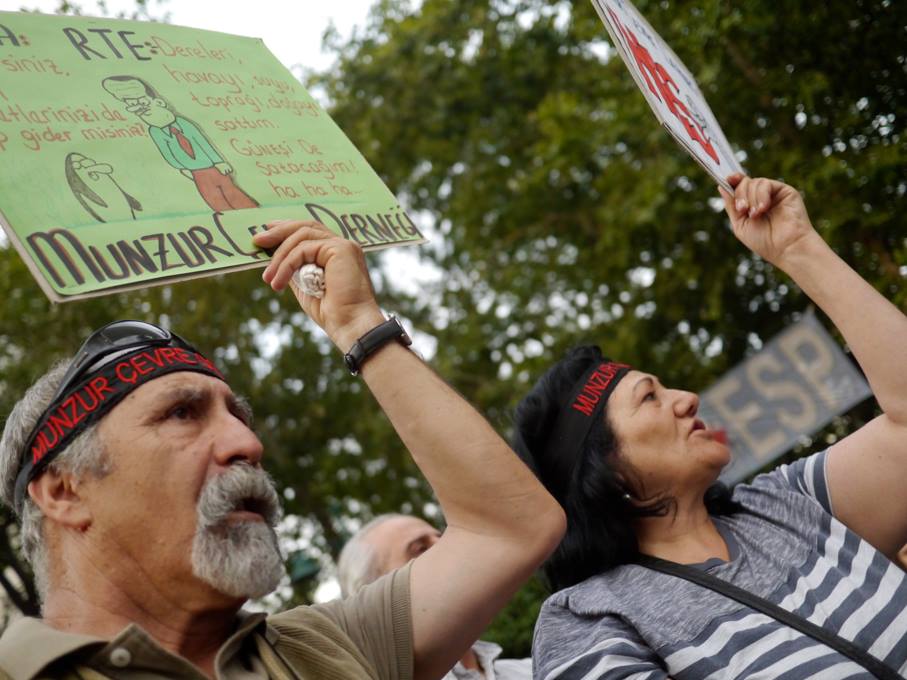
A Turkish couple hold up signs protesting Prime Minister Recep Tayyip Erdogan and the Turkish press. Photo: Matthew Herman.
On a sunny, cool day in early October I visited Fatih, a conservative neighborhood along the Golden Horn. It was a weekday and I watched as the morning crowd thinned out as workers left and then thickened again as they returned, hopping off buses or crowding the sidewalks. There are a few mosques in Fatih and the women generally cover their heads, often with scarves purchased at one of the neighborhood’s many Islamic fashion stores. Restaurants tend to be dry.
Most Fatih residents are presumed to be observant Muslims and AKP supporters. Furkan, a 27-year-old plumbing company employee, said, “In every sense of the word, the AKP is open to all communities in Turkey. They work for the freedom of many people, Sunnis, Alevis, Kurds…” I asked him whether it was important that the leader of Turkey have a religious identity. “If our prime minister believes and acts in accordance then it’s between him and God,” he said. “It’s a free country, he can act as he likes.”
“We are a powerful country with a powerful government,” a perfume seller in his thirties told me. “I support the AKP because they represent us completely.” He did not characterize himself as religious, but he acknowledged the struggles of Turkey’s religious community. “There was a long time in Turkey where people were labeled fanatics if they prayed… Let me ask you a question, If you see a boy in the U.S. reading a Bible, do you label him a fanatic?” He went on. “Are all Muslims terrorists? The people in Taksim were harmful for the country. We have two perfume shops in Taksim, and they were harmed by the protesters.”
An elderly man sitting on a park bench told me that he had been raised in a secular home but wished he hadn’t been. “Maybe if I had been raised differently, I would pray five times a day.” He voted twice for the AKP, and supports Erdoğan’s restrictions on alcohol. “Alcohol is a bad thing,” he told me. “I know; I drank for thirty years.”
Everyone I spoke to in Fatih supported the AKP, except for Fatima. “If you see people drinking alcohol, you assume that they vote for the CHP,” she said. “This is an incorrect assumption.” Fatima was not drinking alcohol when we spoke. She was on a short break at the Islamic fashion store in which she worked as a salesperson. She wore a green headscarf purchased at the store. I asked her if people assumed she supported the AKP because of her religious beliefs. “This is the general bias in Turkey,” she said. “They see people in scarves and think that they vote for the AKP.” She fiddled with her walkie-talkie, silencing it and putting it back in the pocket of her overcoat. “It’s nice if the leader is a religious man,” she said. “But democracy and Islam are two separate structures. We say we are a Muslim country, so it’s natural that the prime minister would be a Muslim. But we also say that we are a democracy, so we have to act that way.”
Jenna Krajeski is a writer living in Istanbul. Reporting for this story was funded by a grant from the Pulitzer Center on Crisis Reporting.
With support from the Henry R. Luce Initiative on Religion and International Affairs.


